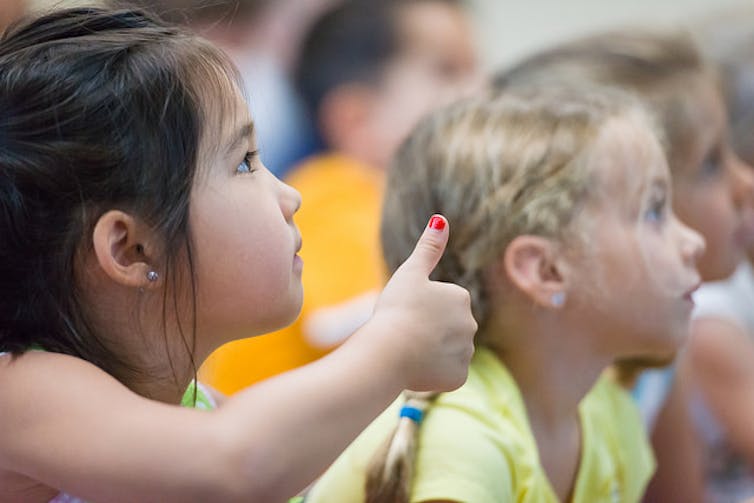The 'right' age to start school varies for each child
- Written by Kimberley Pressick-Kilborn, Senior Lecturer and researcher in Education, University of Technology Sydney
It’s that time of year again, when the noticeboard outside your local primary school is likely to read “Enrol your child for kindergarten/prep now”. But how do you know what the “right” age to start school is?
There is variation in the ideal age to start school for each child, because it’s not simply about the readiness of the individual child. It’s also about the family context and the readiness of the school for that child to start. In other words, what happens at school once the child gets there is more important than their age.
The ‘right’ age to start school in Australia
Since the Australian curriculum was endorsed in 2015, there has been ongoing public debate about whether there also should be a uniform school starting age. But across Australia, the cut-offs for starting school are still varied:
At independent schools, the recommended starting age may vary yet again. When parents read media reports of educationally successful countries (such as Finland, Denmark and Sweden) where children start school aged seven, the question of the “right” age becomes even more confusing.
Questions parents can ask to decide the right age
A review of the research on school transitions was published recently by Australian researchers. It shows that while there are different theoretical approaches taken to framing school transitions, six concepts are common: readiness, relationships, transition activities, teaching methods, power, and policy.
In relation to these six concepts, and drawing on ongoing research, here are some key questions parents can ask to determine whether to send child to school this year.
 Social, cultural and other contextual factors particular to your family and the school are as important as the needs of individual children.
Shutterstock
Social, cultural and other contextual factors particular to your family and the school are as important as the needs of individual children.
Shutterstock
Readiness
How does the preschool/school define readiness?
are there particular types of knowledge, skills or abilities children are expected to have prior to starting at that school?
what are the social and emotional skills expected in different contexts, such as during whole class activities, in working independently, when working in small groups or in the playground?
Parents can reflect on their child’s and family’s needs, and how well matched these are to a school’s definition. Children are often required to increasingly self-regulate, focus and participate independently in a range of activities during the first year of school.
Relationships
- What is the quality and nature of my child’s peer friendships? Will they have friends starting at the same school?
Read more: Why are more parents choosing to delay when their child starts school?
- how does the school work with families and local community to establish and develop strong relationships?
Relationships are key to children developing a sense of belonging in their new school.
Transitions activities
- What formal and informal programs and activities are in place to help children and families settle into school, in the year before school starts and during the first year?
These focus on helping the child and family prepare for school, as well as for the school to prepare to meet your child’s needs.
Approaches to teaching and learning
Does the school emphasise a play-based program, or is there a stronger academic focus in kinder/prep?
what literacy and numeracy skills and knowledge does the particular school anticipate a “typical” kinder/prep student to start and finish the first year with?
 Parents need to ask questions about not just academic considerations, but social-emotional readiness and development as well.
Howard County Library System/flickr, CC BY-NC-ND
Parents need to ask questions about not just academic considerations, but social-emotional readiness and development as well.
Howard County Library System/flickr, CC BY-NC-ND
what are some of the teaching and learning strategies used by class teachers to engage different students (for example, children with disabilities)?
how structured is the classroom environment in the first year of school? What is expected of children in a typical day?
is there homework in the first year of school and what does this involve?
All primary teachers have professional knowledge that prepares them to modify and adapt their teaching and learning to suit wide-ranging student needs. Asking these questions should help parents decide if their child is suited to the approaches that commonly featured in teaching and learning programs at that particular school.
Power
Are there opportunities for children to participate in decision-making processes in the classroom and at school (for example, is there a student council)?
how can families become involved and contribute to programs at the school and in the classroom?
Primary schools usually see themselves in partnership with parents in each child’s education. Many schools seek ways to meaningfully involve the children themselves and the parent community.
Policy
- What school-based policies are there to guide decisions that will enhance the learning of my child?
Read more: How do you know when your child is ready for school?
While certainly not exhaustive, these questions can provide a basis for conversations you might have within your family and with early childhood educators at your child’s preschool or daycare as well as the school’s principal and kinder or prep teachers.
The Australian curriculum assumes students will start school by the time they have turned six. So the learning outcomes in the first year of school have been written to suit “typical” learners of this age.
But chronological age is only a crude indicator of the “right” age to start school for any child. Social, cultural and other contextual factors particular to your family and the school are as important as the dispositions, traits and needs of individual children.
Authors: Kimberley Pressick-Kilborn, Senior Lecturer and researcher in Education, University of Technology Sydney
Read more http://theconversation.com/the-right-age-to-start-school-varies-for-each-child-98704



















